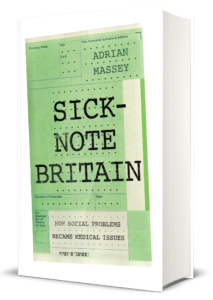We are over-confident in the ability of doctors to solve all manner of problems, yet too much medicine is bad for us. Hippocrates was the first to acknowledge the corresponding duty on doctors: to be humble, and thereby to do no harm.
As an occupational physician I recognise that work is crucial as a determinant of health. Overwhelmingly work contributes positively to physical and mental health, social inclusion, self-worth, financial security and social mobility. Conversely worklessness tends to be corrosive to health, a cause of poor mental wellbeing, early death and – in the case of the decimated mining villages and industrial heartlands of the 1970s and 1980s – intergenerational health inequalities.
No one can work all the time, most people can’t work some of the time, and some people’s health problems are so severe that they can never work. We must be realistic and humane. But avoidable worklessness, caused by ill-conceived social policy, is a public health disaster. Doctors such as me are duty bound to speak out.
Mostly when someone is unwell they remain able to work to at least some extent. If their workplace is comfortable at the best of times, and accommodating in difficult times, there is a good chance that they and their manager will be able to find a temporary solution: in which case they will be better again that much sooner.
Medicine has little to offer for most common health problems that transiently affect ability to work – aching backs, aching necks, distress associated with life events such as relationship breakdown and bereavement. It is practical human support and encouragement, especially that of the manager, that is most in need.
This is critically dependent on the quality of the relationship between the line manager and the employee. Managers with emotional intelligence, whose own managers empower them and do not tie them unduly in rigid policy, achieve mutually supportive relationships of trust and goodwill with their teams. Sickness is low in such environments. Sadly they are all too rare.
Many workplaces are still characterised by suspicious, mistrusting employee relations. There is a failure to appreciate that ill employees are simply people, with all the temperamental and mysterious characteristics of such, and not malfunctioning droids. There is little hope for preventing sickness if the manager’s immediate response is simply to direct the struggling employee to their GP for inspection. How is the GP to know what the manager feels able to do to help? Many people unnecessarily fall out of work at this critical point, early in their illness, and into the downward spiral of long-term sickness. After 2 years of such exclusion they are more likely to die, or reach retirement age, than resume work.
Sickness certification is futile because, despite society’s confidence in them, doctors can have no better idea how someone is feeling than anybody else can. Justifiably, they don’t feel that as healers it is their role to interrogate their patients. That is why the majority of doctors issue certificates on demand. Employers have long known it.
It is demeaning to patients, who should not have to jump through hoops to justify their decision if they simply do not feel able to work at that point in time, despite what support their manager might have been able to offer.
It is harmful because it pitches doctors against their patients, facilitates neglectful management practice, and is a cause of much avoidable sickness. Perhaps most importantly of all though, it is a sheer waste. The health service is on its knees, patients having to wait an average of 13 days to see a GP with an average appointment length of 562 seconds when they get there. It cannot be right that we are squandering approximately 7,000,000 such appointments to satisfy the administrative demands of employers.
The airing of these problems is long overdue. In Sick-Note Britain I argue that it is impossible for doctors to validate sickness and that, given the harms caused by their efforts to do so, we should free them for useful clinical work instead. In the same way we should rethink the ethics of the Work Capability Assessments used to determine the eligibility of the unemployed for state sickness benefits. The evidence is that these cause harm to vulnerable people, yet we could target benefits to them more kindly and efficiently (meaning we could enhance the level of benefit too). Finally there is consideration of the harm caused by the Equality Act’s attempt to define and measure disability, and suggestions for reform.
Sick-Note Britain is a plea for an evidence-based approach to sickness and disability policy for the sake of our heath service, our economy, and the lives and life chances of individuals.

by Adrian Massey
Hardback | February 2019
£20.00 | 9781787381223 | 368ppp